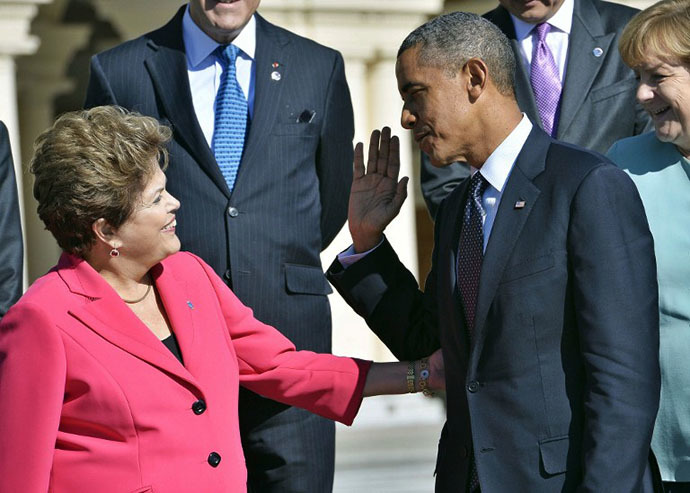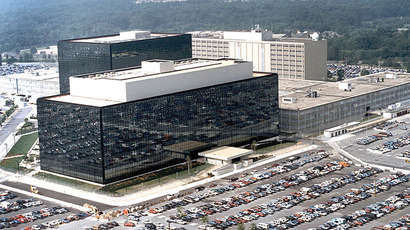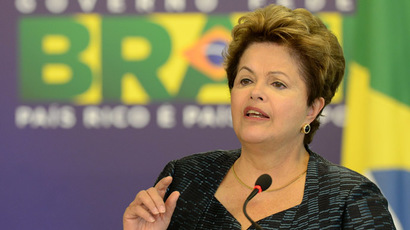Brazilian president postpones visit to Washington over US spying
Brazilian President Dilma Rousseff has postponed a state visit to Washington in response to the US spying on her communications with top aides. Rousseff is demanding a full public apology from President Obama.
Barack Obama spoke with Rousseff on Monday in an attempt to
persuade her into following through with the trip, the Brazilian
president's office said, according to AP.
Brazil’s TV Globo reported that the call between the two
presidents lasted for about 20 minutes. Obama and Rousseff
discussed revelations that the National Security Agency (NSA)
spied on the Brazilian leader’s phone calls and emails. The two
presidents then “jointly” agreed to cancel the meeting, Globo
reported, citing the presidential office.
The Brazilian government said in a statement that "the
conditions are not suitable to undertake this visit on the agreed
date." It expressed hope that the conflict will be resolved
“properly” and the trip will happen "as soon as
possible."
The state visit was initially scheduled for October 23. The Obama
administration has confirmed that the visit was canceled.
"The president has said that he understands and regrets the
concerns disclosures of alleged US intelligence activities have
generated in Brazil and made clear that he is committed to
working together with President Rousseff and her government in
diplomatic channels to move beyond this issue as a source of
tension in our bilateral relationship," said White House
spokesman Jay Carney.

Earlier this month, TV Globo revealed in a report that the NSA
monitored the content of phone calls, emails, and mobile phone
messages belonging to President Rousseff and undefined "key
advisers" of the Brazilian government. The NSA also spied on
Mexican President Enrique Pena Nieto and nine members of his
office.
The revelations were based on evidence provided
by former CIA employee and NSA contractor Edward Snowden, which
was passed to British journalist Glenn Greenwald.
A document dated June 2012 showed that the Mexican President's
emails were read through one month before he was elected. In his
communications, the then-presidential candidate indicated who he
would like to appoint to several government posts.
The Brazilian government denounced the NSA surveillance as
“impermissible and unacceptable,” and a violation of
Brazilian sovereignty.
In July, Greenwald co-wrote articles for O Globo, in which he
claimed that some of the documents leaked by Snowden indicated
that Brazil was the NSA’s largest target in Latin America.
Greenwald wrote that the NSA was collecting its data through an
undefined association between US and Brazilian telecommunications
companies, but he could not verify that Brazilian companies had
been involved.
Following the revelations, the Brazilian government ordered an
investigation into telecommunications
companies to determine whether they illegally shared data with
the NSA.
Defense ministers of Brazil and Argentina signed a broader
military cooperation agreement on September 13. The two
governments will work together to improve cyber defense
capabilities following revelations of Washington’s spying on
Latin American countries.
Brazil will be providing cyber warfare training to Argentine
officers from 2014.
Some experts believe that Brazil, along with other countries, should use the NSA leaks scandal as an opportunity to take a stand on internet governance.
“The fact is the government wants to offer Brazilian internet users a stronger protection for their privacy. It is a great opportunity, not only for Brazil, but for many countries to really take a stand on internet governance and really try to understand how the future of the internet and communications as a whole will end up coming out of this huge scandal about the NSA leaks,” director of the Institute of Technology and Society, Carlos Affonso Souza, told RT.














